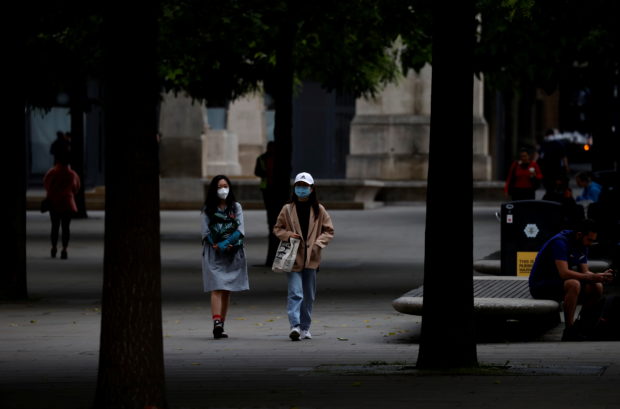Return to normal? UK PM Johnson outlines end to England’s virus restrictions

People wear protective masks as they walk through the city centre, amid the outbreak of the coronavirus disease (COVID-19) in Manchester, Britain, June 21, 2021. REUTERS FILE PHOTO
LONDON — British Prime Minister Boris Johnson set out plans on Monday to end social and economic COVID-19 restrictions in England in two weeks’ time, a test of whether a rapid vaccine rollout offers enough protection from the highly contagious Delta variant.
Johnson confirmed the government aimed to end restrictive measures on July 19, with a final decision to be taken next week. He said the step would eliminate formal limits on social contact, the instruction to work from home, and mandates to wear face masks.
After imposing the most onerous constraints on behavior in Britain’s peacetime history to battle the novel coronavirus, Johnson is betting the vaccination program, which has weakened the link between infections and hospital admissions, can prevent the health service being overwhelmed by a new wave of COVID-19.
Under the plans, nightclubs will be allowed to reopen and there will be no limits on capacity for hospitality venues. Social distancing guidelines will be scrapped.
“We must be honest with ourselves that if we can’t reopen our society in the next few weeks, when we will be helped by the arrival of summer and by the school holidays, then we must ask ourselves when will we be able to return to normal?” Johnson told a news conference.
Article continues after this advertisement“We will move away from legal restrictions and allow people to make their own informed decisions about how to manage the virus.”
Article continues after this advertisementJohnson’s government sets health policy for England, but not for Scotland, Wales or Northern Ireland.
Britain has suffered the seventh highest global death toll from COVID-19, and Johnson has been accused of being too slow to implement each of England’s three lockdowns.
But the take-up of vaccines in Britain has been strong, with 86% of adults receiving a first dose and 64% receiving two doses as of Monday, according to government data.
Public Health England figures indicate that the vaccines are highly effective in preventing the Delta variant from leading to severe illness or hospital admission, especially after two doses.
End of lockdown
Johnson also said that people under 40 would be invited for their second COVID-19 shots from eight weeks after their first dose, rather than 12 weeks, bringing it into line with the policy for over-40s.
He added that while he believed this was the best time to end restrictions, people should still be cautious and that containment measures could be brought back if needed.
“I didn’t want people to feel that this is, as it were, the moment to get demob happy … it is very far from the end of dealing with this virus,” Johnson said.
“Obviously, if we do find another variant that doesn’t respond to the vaccines … then clearly, we will have to take whatever steps we need to do to protect the public.”
Opposition Labour Party leader Keir Starmer criticized the plan, and said that some legal measures, such as the requirement to wear masks on public transport, should be kept in place.
“Simply throwing off all protections when the infection rate is going up is reckless,” he told broadcasters.
For more news about the novel coronavirus click here.
What you need to know about Coronavirus.
For more information on COVID-19, call the DOH Hotline: (02) 86517800 local 1149/1150.
The Inquirer Foundation supports our healthcare frontliners and is still accepting cash donations to be deposited at Banco de Oro (BDO) current account #007960018860 or donate through PayMaya using this link.